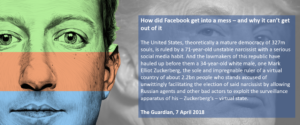 Facebook and Cambridge Analytica now face a series of class actions for ‘surveillance capitalism’ in the US – will this open the floodgates for similar legal actions across the world?
Facebook and Cambridge Analytica now face a series of class actions for ‘surveillance capitalism’ in the US – will this open the floodgates for similar legal actions across the world?
Class Action Complaint Case No. 18-cv-02276 has been brought by Patricia King (Plaintiff) in the US District Court for the Northern District of California and has asked for trial by jury.
The class action reads as follows:
1. Facebook is a social networking platform that engages in surveillance capitalism: It monetizes personal and behavioral data which it acquires through real-time surveillance of Facebook users. (see Shoshana Zuboff, Big Other: Surveillance Capitalism and the Prospects of an Information Civilization, 30 J. Info. Tech. 75 (Apr. 4, 2015), available at http://ssrn.com/abstract=2594754).
2. This practice of deriving profits from the surveillance, analysis, and modification of behavior happens without the consent or knowledge of Facebook users.
3. Public outcry over Cambridge Analytica’s use of Facebook data in election campaigns confirms that Facebook has not adequately informed its members that their behaviors, social relationships, and intimate details are being used in contexts and for purposes completely different from those for which this information is provided.
As widely reported, Cambridge Analytica targeted voters with personalized messages shaped by a prediction of personality traits derived from Facebook data, and it did so without Facebook users’ knowledge or consent.
4. But this exploitation of Facebook data is not limited to elections or one actor. These technologies are also applied in commercial marketing, including by Facebook. The company regularly uses its surveillance platform “to figure out your personal psychological susceptibilities and then charge(s) advertisers to exploit them.” (see http://www.nybooks.com/daily/2018/04/12/reining-in-big-datas-robber-barons/)
5. The seemingly unrestricted surveillance and analysis of daily interactions and behaviors on the Facebook platform far exceeds user expectations of how personal data is used.
Users are not adequately informed that Facebook regularly runs experiments on them. Nor are they adequately told that seemingly innocuous interactions on the platform, such as “liking” content, can be used to predict highly sensitive information with great accuracy, including sexual orientation, ethnicity, political or religious views, or drug use.
Nor are users clearly told that, although they may set privacy settings which control the sharing of certain data on an interpersonal level, “what users cannot adjust with Facebook’s privacy settings is how the platform itself takes advantage of the rich digital profiles it stores about users.”
(see p.7, https://crackedlabs.org/dl/CrackedLabs_Christl_DataAgainstPeople.pdf)
The full extent of Facebook’s surveillance capitalism remains secret.
6. Plaintiff Patricia King is among the reportedly 87 million persons in the United States whose Facebook data Cambridge Analytica obtained in order to build psychographic profiles for voter micro-targeting. She files this class action complaint seeking to change Facebook’s business practices, for breach of contract, and for violations of federal and state law.
For more information on the GDPR Programme, Henley Business School, click here
To pre-order GDPR Handbook, published worldwide on 3 June, click here
To order your hard copy with a 36-page index of the GDPR, printed and bound by F.J Blissett & Co. Ltd, Bookbinders by Appointment to Her Majesty the Queen, click here














Recent Comments